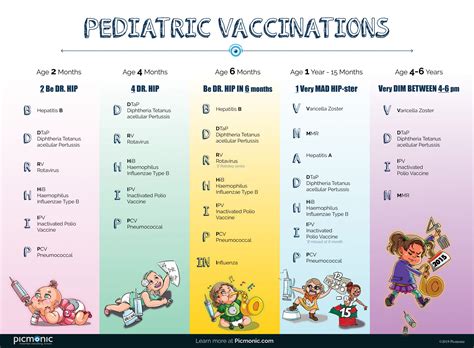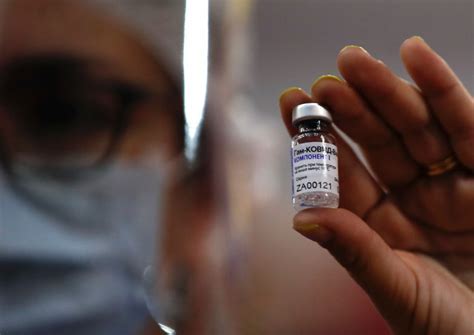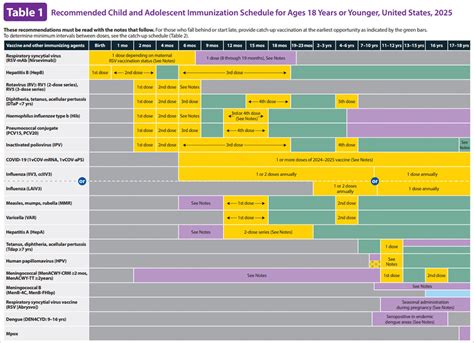Intro
Protect your babys health with the 4 essential vaccines at 4 months. Learn what to expect from the DTaP, Hib, IPV, and PCV vaccinations, including potential side effects and benefits. Stay informed about infant immunization schedules and ensure your childs well-being with our comprehensive guide to 4-month vaccinations.
As a new parent, it's natural to have questions and concerns about your baby's health, especially when it comes to vaccinations. At 4 months old, your little one is due for several essential vaccines that will help protect them from serious diseases. In this article, we'll break down what to expect during this milestone and provide you with valuable information to make informed decisions about your baby's health.
Vaccinations are a crucial part of your baby's healthcare, and the 4-month mark is an important milestone in their vaccination schedule. At this stage, your baby will receive four essential vaccines that will help safeguard them against serious diseases. But before we dive into the details, let's take a closer look at why vaccinations are so important.

Why Vaccinations Matter
Vaccinations are a safe and effective way to protect your baby from serious diseases that can cause illness, disability, and even death. By vaccinating your baby, you're not only protecting them, but also helping to prevent the spread of diseases in your community. Vaccinations have been widely used for decades and have been proven to be safe and effective in preventing serious diseases.
The 4 Essential Vaccines at 4 Months
At 4 months old, your baby will receive four essential vaccines:
- DTaP (Diphtheria, Tetanus, and Pertussis) vaccine: This vaccine protects against three serious diseases: diphtheria, tetanus, and pertussis (also known as whooping cough).
- IPV (Inactivated Poliovirus) vaccine: This vaccine protects against polio, a serious disease that can cause paralysis and even death.
- Hib (Haemophilus influenzae type b) vaccine: This vaccine protects against Hib disease, which can cause serious illnesses like meningitis and pneumonia.
- PCV (Pneumococcal Conjugate) vaccine: This vaccine protects against pneumococcal disease, which can cause serious illnesses like pneumonia and meningitis.
What to Expect During the Vaccination Appointment
During the vaccination appointment, your baby will receive four injections, one for each vaccine. The injections are usually given in the leg, and your baby may feel a slight pinch or discomfort during the injection. However, this discomfort is usually short-lived and can be soothed with a pacifier or a comforting hug.

Common Side Effects of Vaccines
Like any medication, vaccines can cause side effects. However, these side effects are usually mild and temporary. Common side effects of vaccines include:
- Redness, swelling, or pain at the injection site
- Fever
- Fussiness or irritability
- Loss of appetite
In rare cases, vaccines can cause more serious side effects, such as an allergic reaction. However, these serious side effects are extremely rare and can be treated promptly by a healthcare professional.
What to Do After the Vaccination Appointment
After the vaccination appointment, it's essential to monitor your baby's temperature and watch for any signs of side effects. If your baby develops a fever or shows signs of discomfort, you can try the following:
- Give your baby a lukewarm bath to help reduce their temperature
- Use a cool compress to soothe the injection site
- Offer your baby a pacifier or a comforting hug to help calm them down

Conclusion
The 4-month vaccination appointment is an essential milestone in your baby's healthcare. By understanding what to expect and being prepared, you can help make this experience as smooth as possible for your baby. Remember, vaccinations are a safe and effective way to protect your baby from serious diseases, and by staying on schedule, you're helping to safeguard their health and well-being.

Additional Tips and Reminders
- Always follow the recommended vaccination schedule to ensure your baby receives the best protection against serious diseases.
- Keep a record of your baby's vaccinations to ensure they stay on schedule.
- If you have any concerns or questions about vaccinations, don't hesitate to reach out to your healthcare professional.
What are the benefits of vaccinations?
+Vaccinations are a safe and effective way to protect your baby from serious diseases. By vaccinating your baby, you're not only protecting them, but also helping to prevent the spread of diseases in your community.
What are the common side effects of vaccines?
+Common side effects of vaccines include redness, swelling, or pain at the injection site, fever, fussiness or irritability, and loss of appetite. In rare cases, vaccines can cause more serious side effects, such as an allergic reaction.
What should I do if my baby develops a fever after vaccination?
+If your baby develops a fever after vaccination, you can try giving them a lukewarm bath to help reduce their temperature. You can also use a cool compress to soothe the injection site and offer your baby a pacifier or a comforting hug to help calm them down.
